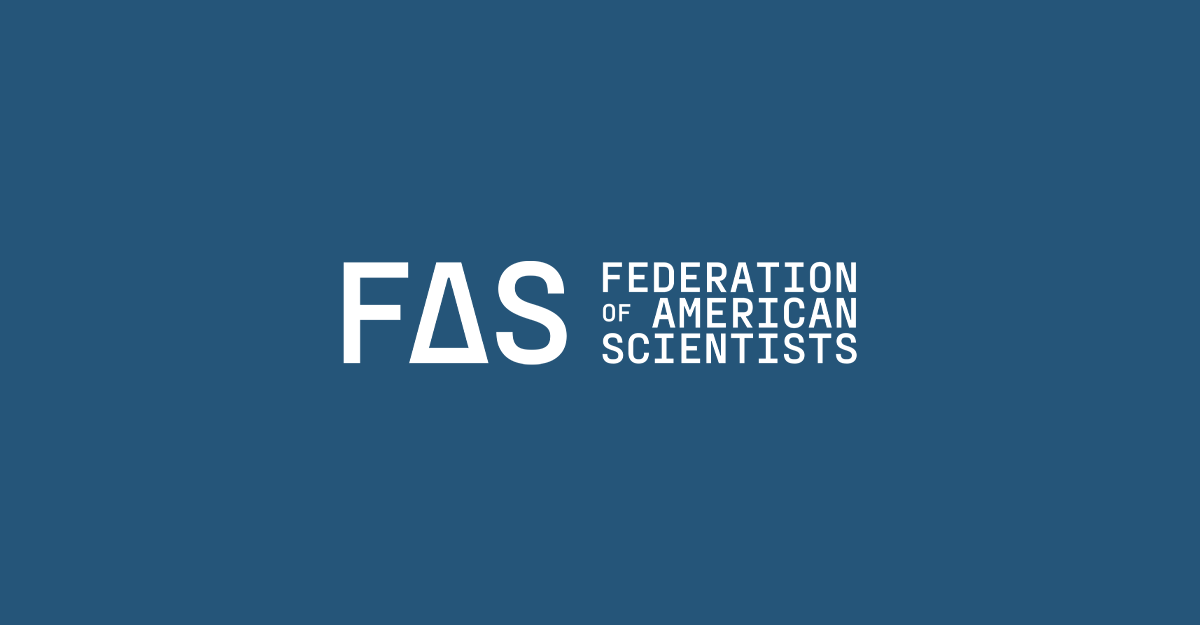
The Federation of American Scientists (FAS) Applauds the Newly Announced Board Selected to Lead the Foundation for Energy Security and Innovation (FESI)
FAS eager to see the Board set an ambitious agenda that aligns with the potential scale of FESI’s impact
Washington, D.C. – May 9, 2024 – Earlier today Secretary of Energy Granholm took the first official step to stand up the Department of Energy-affiliated non-profit Foundation for Energy Security and Innovation (FESI) by appointing its inaugural board. Today the “Friends of FESI” Initiative of the nonpartisan, non-profit Federation of American Scientists (FAS) steps forward to applaud the Secretary, congratulate the new board members, and wish FESI well as it officially begins its first year. The Inaugural FESI Board consists of 13 accomplished members whose backgrounds span the nation’s regions and communities and who have deep experience in innovation, national security, philanthropy, business, science, and other sectors. It includes:
- Jason Walsh, BlueGreen Alliance
- Nancy Pfund, DBL Partners
- Rita Baranwal, Westinghouse Electric
- Vicky Bailey, Anderson Stratton
- Mike Boots, Breakthrough Energy
- Miranda Ballentine, Clean Energy
- Stephen Pearse, Yucatan Rock
- Noel Bakhtian, Bezos Earth Fund
- Mung Chiang, President of Purdue University
- Noelle Laing, Builder’s Initiative Foundation
- Katie McGinty, Johnson Controls
- Tomeka McLeod, Hydrogen VP at bp
- Rudy Wynter, National Grid NY
Since the CHIPS and Science Act authorized FESI in 2022, FAS, along with many allies and supporters who collectively comprise the “Friends of FESI,” have been working to enable FESI to achieve its full potential as a major contributor to the achievement of DOE’s vital goals. “Friends of FESI” has been seeking projects and activities that the foundation could take on that would advance the DOE mission through collaboration with private sector and philanthropic partners.
“FAS enthusiastically celebrates this FESI milestone because, as one of the country’s oldest science and technology-focused public interest organizations, we recognize the scale of the energy transition challenge and the urgency to broker new collaborations and models to move new energy technology from lab to market,” says Dan Correa, CEO of FAS. “As a ‘Friend of FESI’ FAS continues our outreach amongst our diverse network of experts to surface the best ideas for FESI to consider implementing.” The federation is soliciting ideas at fas.org/fesi, underway since FESI’s authorization.
FESI has great potential to foster the public-private partnerships necessary to accelerate the innovation and commercialization of technologies that will power the transition to clean energy. Gathering this diverse group of accomplished board members is the first step. The next is for the FESI Board to pursue projects set to make real impact. Given FESI’s bipartisan support in the CHIPS & Science Act, FAS hopes the board is joined by Congress, industry leaders and others to continue to support FESI in its initial years.
“FESI’s establishment is a vital initial step, but its value will depend on what happens next,” says David M. Hart, a professor at George Mason University’s Schar School of Policy and Government and leader of the “Friends of FESI” initiative at FAS. “FESI’s new Board of Directors should take immediate actions that have immediate impact, but more importantly, put the foundation on a path to expand that impact exponentially in the coming years. That means thinking big from the start, identifying unique high-leverage opportunities, and systematically building the capacity to realize them.”
###
ABOUT FAS
The Federation of American Scientists (FAS) works to advance progress on a broad suite of contemporary issues where science, technology, and innovation policy can deliver dramatic progress, and seeks to ensure that scientific and technical expertise have a seat at the policymaking table. Established in 1945 by scientists in response to the atomic bomb, FAS continues to work on behalf of a safer, more equitable, and more peaceful world. More information at fas.org.
Resources
Building a Firm Foundation for the DOE Foundation: It All Starts with a Solid Board
https://fas.org/publication/fesi-board-launch/
FAS use case criteria:
https://fas.org/publication/fesi-priority-use-cases/
FAS open call for FESI ideas:
https://fas.org/publication/share-an-idea-for-what-fesi-can-do-to-advance-does-mission/
DOE announcing FESI board:
https://www.energy.gov/articles/doe-appoints-inaugural-board-directors-groundbreaking-new-foundation
DOE release announcing FESI:
https://www.energy.gov/articles/doe-launches-foundation-energy-security-and-innovation
How DOE can emerge from political upheaval achieve the real-world change needed to address the interlocking crises of energy affordability, U.S. competitiveness, and climate change.
As Congress begins the FY27 appropriations process this month, congress members should turn their eyes towards rebuilding DOE’s programs and strengthening U.S. energy innovation and reindustrialization.
Politically motivated award cancellations and the delayed distribution of obligated funds have broken the hard-earned trust of the private sector, state and local governments, and community organizations.
Over the course of 2025, the second Trump administration has overseen a major loss in staff at DOE, but these changes will not deliver the energy and innovation impacts that this administration, or any administration, wants.